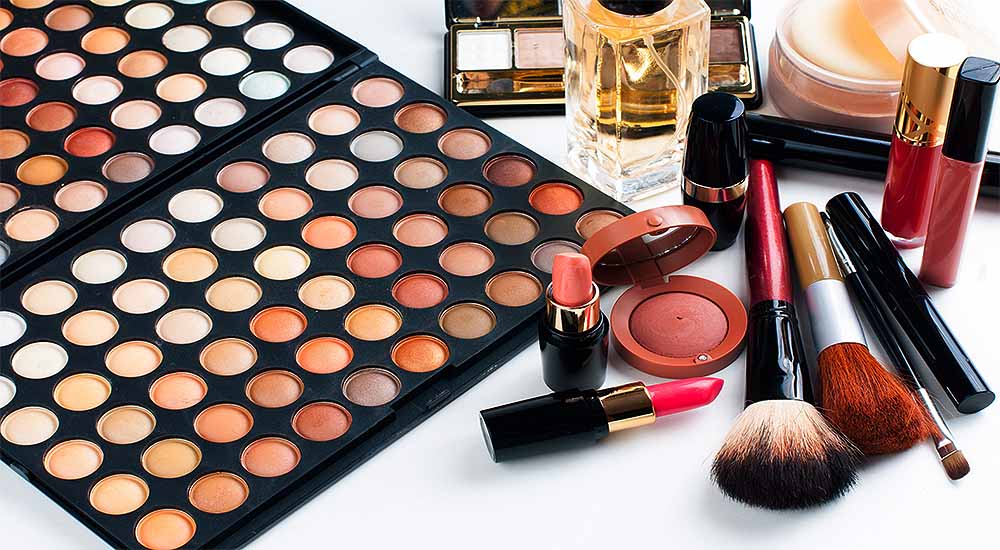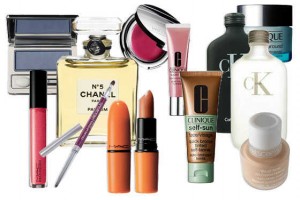Gluten Intolerant? What’s In Your Cosmetics?

 Is ‘Applying’ Gluten Topically a Problem?
Is ‘Applying’ Gluten Topically a Problem?
I’m often asked if gluten-containing ingredients found in ‘non-food’ items are important to avoid for those who have celiac disease or gluten sensitivity. To answer the question we need to discuss how something you are not actually eating has the potential to affect you.
How is Your Skin Like Your Gut?
The skin is the largest organ you have. Because it’s on the outside, we sometimes fail to appreciate that it is an organ. It is felt that the health of the skin reflects the health of the intestine, so anyone with skin issues should try to improve the health of their digestive tract.
Actually, when a fetus is forming inside its mother’s womb, the outer skin folds in to ‘make’ the intestines. If you think about the connection from the mouth at the top to the anus at the bottom, you can perhaps visualize that the intestine is considered to be ‘outside’ the body, just like the skin. Food and nutrition must ‘leave’ the intestine via the bloodstream to truly get ‘inside’ the body and nourish the cells.
Getting back to our skin is a permeable organ, and therefore things that the skin is exposed to can very much affect the body internally through absorption.
Can Gluten Pass Through the Skin?
In the past, it has been stated that the gluten molecule was just too large to be able to gain access to the body via the skin. Therefore it was strongly stated by some that there was no concern in topical applications of gluten-containing crèmes, face products, make-up, or shampoo. While I’m sure the researchers that made such statements felt they were accurate, I would like to state that they likely were not clinicians working with patients. If they had experienced working with gluten intolerant patients on a daily basis they would soon realize that patients do indeed react to topical applications of products that contain gluten.
When confronted with research findings that differ from patient reactions, I roll up my sleeves and dig deeper into the research world. Typically what I have found is that my patients never steer me wrong. It was my patients, who did not have celiac disease but who very obviously still reacted to gluten, that caused me to write the book “The Gluten Effect”. And now ‘gluten sensitivity’ is an accepted condition.
Do You Have Leaky Skin?
Sure enough, when I looked deeper into the research, I found the information that explained the phenomena of which my patients spoke. And what I learned is that skin can be ‘leaky’ just the way the gut can be. And leaky skin has openings that do allow gluten proteins to penetrate and, in such a patient, that reaction can be mild or severe, depending on the individual patient. Therefore, depending on the health of your skin, gluten applied topically may or may not bother you.
So if your skin is healthy and you don’t have any of the following conditions you ‘should be’ okay with gluten topically:
- Dry skin
- Acne
- Psoriasis
- Eczema
- Rashes or bumps
- Dermatitis herpetiformis (DH) – a form of celiac disease
Here is What I Recommend
We know that a leaky gut can be chronic or transitory. Meaning that you can be ‘mostly healthy’ but something you get exposed to creates a temporary leaky gut. Could it be the same with the skin?
Likely. Therefore if you are gluten intolerant, even if you have healthy skin, I caution you against adopting a daily regimen with a product that contains gluten, and I would include oats in that caution as they are likely cross-contaminated with wheat. What if you are at a spa, let’s say, and someone puts on a product that contains some wheat germ oil or oat grass?
If your skin seems healthy at the moment, I wouldn’t necessarily worry about it. If you are having some skin issues or any recent gluten contamination that has you feeling poorly, I would caution the aesthetician that you need to avoid such products.
However, as much as you might like a new product that you’ve tried at a spa or gym, I would urge you not to buy it for daily consumption if it contains gluten or oats.
Personally, I recently had to make such a decision on an all-organic skincare line that I found. Believe me, truly organic lines are hard to find, so if you know of one let me know! But after being ecstatic at finding it, I was then devastated to discover oat grass as an ingredient. As you may know, the protein in the grass doesn’t form until the grass is about two weeks old and it is the protein portion of the grain that’s problematic. Therefore young oat grass (and wheatgrass too for that matter) should be perfectly fine.
I contacted the aesthetician who created the line and she was unable to ensure me of the age of the grass used. I personally tested the product for gluten and it tested fine, but I still couldn’t move forward. Why? I couldn’t live with myself if ‘sometimes’ the grass used was a bit too old and it did contain gluten. It just wasn’t a chance I would ever take with my patients – we both work too hard to keep them healthy.
I hope this was useful to you. Have you ever reacted to a topical form of gluten?
Do you need help with your health?
We have the diagnostic and testing tools, the clinical experience, and a different medical approach to discovering the root cause of why you have the symptoms that are bothering you. As long as you are ready to make some dietary and lifestyle changes, we can help you. We will "hold your hand" through the changes, step by step, to make each step an easy one. We are located in Clearwater, FL, at 1000 S Ft Harrison, at the corner of Ft. Harrison Ave. and Magnolia St. There is plenty of parking space directly accessible from Ft Harrison. If it is not convenient for you to come to Root Cause Medical Clinic, we offer telehealth/telemedicine consultations to residents of certain states. Call us for details.
Contact us for a Consultation – Call 727-335-0400

Dr. Vikki Petersen DC. CCN
Founder of Root Cause Medical Clinic
Certified Functional Medicine Practitioner
Dr Vikki Petersen is a public speaker, author of two books, several eBooks and creates cutting edge content for her YouTube community. Dr Vikki is committed to bringing Root Cause Medicine and its unique approach to restoring health naturally to the world.
Ask a Doctor
Have a health concern you'd like to speak with a doctor about? Or just want clarity on a subject? Ask Us!

 Is ‘Applying’ Gluten Topically a Problem?
Is ‘Applying’ Gluten Topically a Problem?
